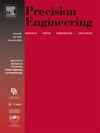Advanced back grinding of semiconductor wafers using an angle-feedback TTV compensation controller
IF 3.7
2区 工程技术
Q2 ENGINEERING, MANUFACTURING
Precision Engineering-Journal of the International Societies for Precision Engineering and Nanotechnology
Pub Date : 2025-08-08
DOI:10.1016/j.precisioneng.2025.08.001
引用次数: 0
Abstract
As the semiconductor industry advances toward higher performance and integration, precise wafer back grinding has become increasingly vital. This study introduces an innovative, in-house wafer back grinding system that features a non-contact laser displacement sensor for inline Total Thickness Variation (TTV) measurement—eliminating the need to detach wafers during processing. By integrating real-time measurement and feedback, the proposed system minimizes process-induced errors, streamlines workflow, and significantly boosts manufacturing efficiency. A novel algorithm based on rotation matrix-based angle compensation adjusts the α and β tilting angles to align the wafer and grinding wheel planes accurately. Experimental validation shows that TTV was improved by an average of 510 % with TTV distribution errors reduced by 74.6 %, bringing values consistently within micron-level tolerances. This research marks a major step toward real-time optimization of the back grinding process. The proposed method is compatible with both rough and fine grinding wheels, offering scalable improvements in wafer quality and throughput. These results underscore the critical role of integrated measurement and adaptive angle-feedback algorithms in next-generation semiconductor manufacturing.
采用角度反馈TTV补偿控制器的半导体圆片高级反磨
随着半导体行业向更高的性能和集成度发展,精确的晶圆背面磨削变得越来越重要。本研究介绍了一种创新的内部晶圆背面磨削系统,该系统具有用于在线总厚度变化(TTV)测量的非接触式激光位移传感器,从而消除了在加工过程中拆卸晶圆的需要。通过集成实时测量和反馈,该系统最大限度地减少了过程引起的错误,简化了工作流程,并显着提高了制造效率。提出了一种基于旋转矩阵的角度补偿算法,通过调整α和β倾斜角度来实现晶圆与砂轮平面的精确对准。实验验证表明,TTV平均提高了510%,TTV分布误差降低了74.6%,结果一致在微米级公差范围内。该研究标志着向实时优化背磨工艺迈出了重要的一步。所提出的方法兼容粗砂轮和细砂轮,提供可扩展的改善晶圆质量和吞吐量。这些结果强调了集成测量和自适应角度反馈算法在下一代半导体制造中的关键作用。
本文章由计算机程序翻译,如有差异,请以英文原文为准。
求助全文
约1分钟内获得全文
求助全文
来源期刊
CiteScore
7.40
自引率
5.60%
发文量
177
审稿时长
46 days
期刊介绍:
Precision Engineering - Journal of the International Societies for Precision Engineering and Nanotechnology is devoted to the multidisciplinary study and practice of high accuracy engineering, metrology, and manufacturing. The journal takes an integrated approach to all subjects related to research, design, manufacture, performance validation, and application of high precision machines, instruments, and components, including fundamental and applied research and development in manufacturing processes, fabrication technology, and advanced measurement science. The scope includes precision-engineered systems and supporting metrology over the full range of length scales, from atom-based nanotechnology and advanced lithographic technology to large-scale systems, including optical and radio telescopes and macrometrology.

 求助内容:
求助内容: 应助结果提醒方式:
应助结果提醒方式:


